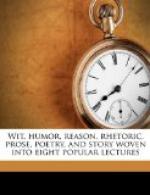When from the depths of solemn sound that same voice arose like the swell of a silver trumpet, and in clarion tones demanded justice, cheer after cheer testified to the power of the orator actress. Never was there a sob of the sea more mournful, than the voice of Sarah Bernhardt as she played upon the harp strings of pity; and never did words rush in greater storm fury from human lips, than when she demanded justice. No stop nor note nor pedal nor key in the organ of speech was left untouched by this genius in tragic art.
It would be well if every public speaker could hear Sarah Bernhardt give that defense of the Maid of Orleans. Indeed I believe if the forensic eloquence of the stage could be transferred to the pulpit greater audiences and greater rewards would follow. If you doubt this, go read the sermons of George Whitefield or the lectures of John B. Gough and you will wonder at their success unless you take into consideration their mysterious power of delivery.
I cannot give you one sentence Madame Bernhardt uttered, but I do know the influence of that address remains with me to this day and now and then I find myself reaching out after the secret of oratory. “It is not so much what you say as how you say it,” has become a proverb.
Some years ago I lectured in an Iowa village on a bitter cold evening. The rear of the hall was up on posts. When introduced there was only one inch between my shoe soles and zero, while a cold wind from a broken window struck the back of my head. It occurred to me that if I would play Bernhardt I might save a spell of pneumonia.
In a few moments I was pacing the platform, swinging my arms and stamping my feet to keep up circulation. I put all the intensity, activity and personality possible into one hour and left the platform.
Returning to the hotel a commercial traveler who had heard me a number of times said: “I congratulate you; you get younger. I never heard you put so much life into your lecture.”
I replied: “Why man, I was trying to keep my feet from freezing.”
He said: “I advise you to go on the platform every evening with cold feet.”
John and Charles Wesley were going along a street in London when they came upon two market women engaged in a wordy war. John Wesley said: “Hold up, Charles, and let’s learn how to preach. See how these women put earnestness and even eloquence into their street quarrel. Can’t we be just as earnest and eloquent in dealing out the truth?” No wonder John Wesley gave such impetus to the platform.
It is said what John Wesley and George Whitefield were to the religious platform, Fox and Burke became later on to the political platform. They saw the platform was fast becoming the voice of public sentiment and dared to indorse it.
When Mr. Fox made his first platform address he said: “This is the first time I ever had the privilege of addressing an uncorrupted assembly.” Going back into Parliament he said: “Let’s put an end to a policy that separates us from the people. Let’s cut all cables, snap all chains that bind us to an unfriendly shore and enter the peaceful harbor of public confidence.”




